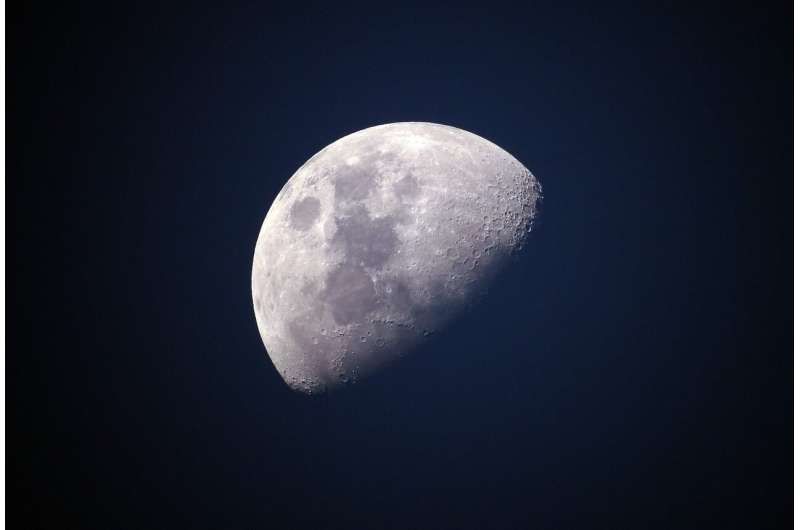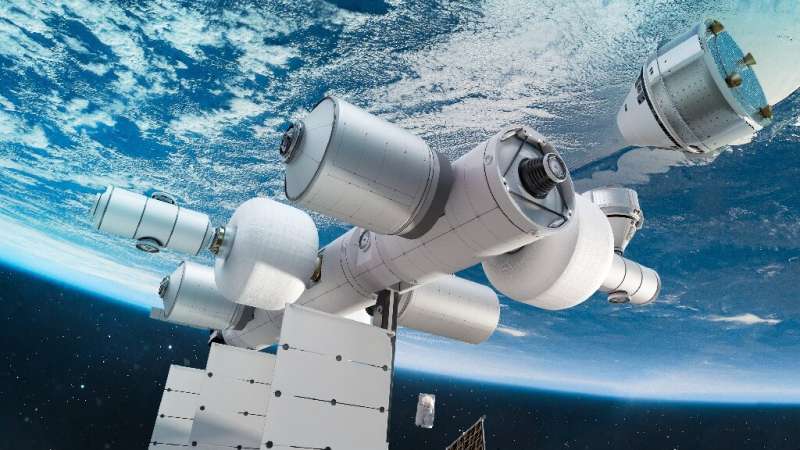
Copernical Team
Neutron star collisions are a "goldmine" of heavy elements, study finds
 Most elements lighter than iron are forged in the cores of stars. A star's white-hot center fuels the fusion of protons, squeezing them together to build progressively heavier elements. But beyond iron, scientists have puzzled over what could give rise to gold, platinum, and the rest of the universe's heavy elements, whose formation requires more energy than a star can muster.
A new study
Most elements lighter than iron are forged in the cores of stars. A star's white-hot center fuels the fusion of protons, squeezing them together to build progressively heavier elements. But beyond iron, scientists have puzzled over what could give rise to gold, platinum, and the rest of the universe's heavy elements, whose formation requires more energy than a star can muster.
A new study Breakthrough Listen releases analysis of previously detected signal
 An intriguing candidate signal picked up last year by the Breakthrough Listen project has been subjected to intensive analysis that suggests it is unlikely to originate from the Proxima Centauri system. Instead, it appears to be an artifact of Earth-based interference from human technologies, the Breakthrough Initiatives announced Monday. Two research papers, published in Nature Astronomy, discu
An intriguing candidate signal picked up last year by the Breakthrough Listen project has been subjected to intensive analysis that suggests it is unlikely to originate from the Proxima Centauri system. Instead, it appears to be an artifact of Earth-based interference from human technologies, the Breakthrough Initiatives announced Monday. Two research papers, published in Nature Astronomy, discu International workshop seeks to turn plans for crewed lunar observatory into reality
 Karan Jani, research assistant professor of physics and astronomy, co-chaired the first international workshop focused on gravitational wave detection on the moon. The workshop builds on Jani's recent studies that make the case for building a crewed, lunar-based observatory.
"We are at the dawn of a new space age, with the moon at the center of our campaign for the next several years," Jan
Karan Jani, research assistant professor of physics and astronomy, co-chaired the first international workshop focused on gravitational wave detection on the moon. The workshop builds on Jani's recent studies that make the case for building a crewed, lunar-based observatory.
"We are at the dawn of a new space age, with the moon at the center of our campaign for the next several years," Jan NASA awards $15M for asteroid hunting telescopes on Maui
 The University of Hawaii Institute for Astronomy (IfA) received a $15 million NASA grant to continue its world-leading efforts to discover Near-Earth Objects (NEOs) and Potentially Hazardous Asteroids (PHAs).
IfA's Panoramic Survey Telescope and Rapid Response System (Pan-STARRS) atop Haleakala currently finds nearly as many NEOs and PHAs as the rest of the world's observatories combined,
The University of Hawaii Institute for Astronomy (IfA) received a $15 million NASA grant to continue its world-leading efforts to discover Near-Earth Objects (NEOs) and Potentially Hazardous Asteroids (PHAs).
IfA's Panoramic Survey Telescope and Rapid Response System (Pan-STARRS) atop Haleakala currently finds nearly as many NEOs and PHAs as the rest of the world's observatories combined, NASA Mars Rover and Helicopter models to go on national tour
 Catch Mars mania as a traveling exhibit visits more than a dozen towns across the U.S. with lifelike models of NASA's Perseverance rover and Ingenuity helicopter.
While NASA's Perseverance rover and Ingenuity Mars Helicopter are hard at work exploring Mars hundreds of millions of miles from Earth, their "twin" models will be visiting museums as part of the "Roving With Perseverance" roadsh
Catch Mars mania as a traveling exhibit visits more than a dozen towns across the U.S. with lifelike models of NASA's Perseverance rover and Ingenuity helicopter.
While NASA's Perseverance rover and Ingenuity Mars Helicopter are hard at work exploring Mars hundreds of millions of miles from Earth, their "twin" models will be visiting museums as part of the "Roving With Perseverance" roadsh A world without access to space
 Over the last several years we have been yelling and screaming about the existential threat of space debris on our ability to conduct space commerce, but the world is not listening. Instead, several organizations continue to add new spacecraft to the near-Earth space environment while totally ignoring the ultimate consequences.
Just over the past 18 months the population of low-orbiting ac
Over the last several years we have been yelling and screaming about the existential threat of space debris on our ability to conduct space commerce, but the world is not listening. Instead, several organizations continue to add new spacecraft to the near-Earth space environment while totally ignoring the ultimate consequences.
Just over the past 18 months the population of low-orbiting ac Blue Origin, partners announce plans for private space station
 Jeff Bezos announced plans on Monday for Blue Origin to run the world's first private space station called the Orbital Reef, which would serve as a space business park and a regular destination for space tourists.
Blue Origin will partner with a Sierra Nevada Corp. subsidiary called Sierra Space, along with Boeing, Redwire Space and Genesis Engineer to make the space station happen.
Jeff Bezos announced plans on Monday for Blue Origin to run the world's first private space station called the Orbital Reef, which would serve as a space business park and a regular destination for space tourists.
Blue Origin will partner with a Sierra Nevada Corp. subsidiary called Sierra Space, along with Boeing, Redwire Space and Genesis Engineer to make the space station happen. New far-out NASA 'travel' video: kayaking on Titan, skydiving on exoplanet
 NASA knows people can't travel to exoplanets light-years away, but the space agency hopes a new, highly fictionalized video will inspire dreams of such far-off travel.
The video depicts wild, even wacky, scenes of people kayaking in deadly methane lakes on Saturn's moon Titan, skydiving on exoplanet HD 40307-g, which is 42 light-years away, and watching twin suns on Kepler-16b - 200 li
NASA knows people can't travel to exoplanets light-years away, but the space agency hopes a new, highly fictionalized video will inspire dreams of such far-off travel.
The video depicts wild, even wacky, scenes of people kayaking in deadly methane lakes on Saturn's moon Titan, skydiving on exoplanet HD 40307-g, which is 42 light-years away, and watching twin suns on Kepler-16b - 200 li NASA's uncrewed Artemis moon mission set to launch in February

NASA's uncrewed Artemis 1 mission to the moon is on track to launch in February, the U.S. space agency said.
The Orion spacecraft was secured this week atop the powerful Space Launch System rocket at NASA's Kennedy Space Center in Florida, meaning the mission was entering its final phase of preparations.
For its flight next year, Orion will swing around the moon without astronauts on board.
It will be a critical test of the Artemis program, which aims to land astronauts on the moon by 2024 and establish a sustained human presence there by 2028, part of the U.S. government's ambitious efforts to get people to Mars in the 2030s.
Artemis has been hit by delays, and even top NASA officials have conceded that the targets will be difficult to meet.
A specific launch date for Artemis 1 will be set after "wet dress rehearsal," a test set for early next year in which the liquid propellants are filled into the massive next-generation rocket, which at 98 meters stands taller than the Statue of Liberty.
The United States remains the only country to have put humans on Earth's nearest neighbor.
Bezos' Blue Origin announces plans for private space station

Jeff Bezos' Blue Origin on Monday announced it wants to launch a space station that will house up to 10 people in the second half of the decade, as the race to commercialize the cosmos heats up.
"Orbital Reef," described in a press statement as a mixed-use business park in space that will support microgravity research and manufacturing, is a joint venture with commercial space company Sierra Space and has the support of Boeing and Arizona State University.
"For over sixty years, NASA and other space agencies have developed orbital space flight and space habitation, setting us up for commercial business to take off in this decade," said Blue Origin executive Brent Sherwood.
"We will expand access, lower the cost, and provide all the services and amenities needed to normalize space flight.
